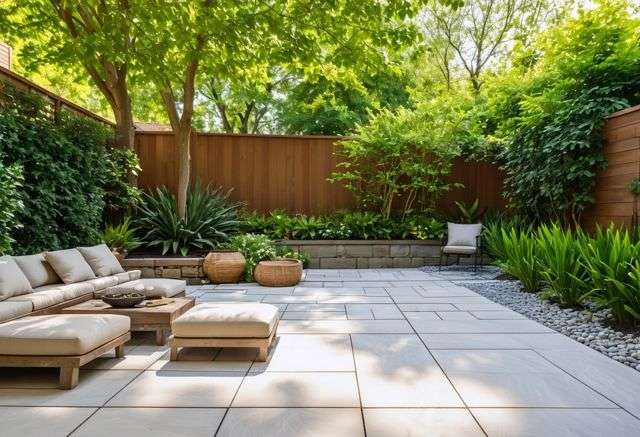
Porcelain Pavers: Aesthetic Appeal, Longevity, and Simple Maintenance

Porcelain pavers offer aesthetic versatility and can mimic natural materials like stone and wood, enhancing any outdoor space. They are durable, weather-resistant, and easy to maintain, making them a pragmatic and stylish choice for patios, driveways, and pool areas.
The Visual Appeal of Porcelain Pavers
Porcelain pavers are a fantastic choice for enhancing outdoor spaces due to their aesthetic versatility. Available in various designs, colors, and finishes, they can easily match any style you envision for your patio, driveway, or pool area.
- Design Options: A broad range of colors, patterns, and textures accommodate diverse aesthetic preferences.
- Mimicry: Can replicate the look of natural stone, wood, and other materials.
- Versatility: Suitable for various outdoor applications like patios, driveways, and pool decks.
These pavers contribute to the overall beauty of your landscape by offering a timeless elegance that complements different design themes. Whether you prefer a modern look or a rustic charm, porcelain pavers fit seamlessly into your outdoor design.

Durability and Weather Resistance
Porcelain pavers offer remarkable longevity and are highly resistant to various weather conditions. Their durability stems from the kiln-drying process, where special clay is fired at extremely high temperatures. This results in a tough, wear-resistant material that can endure heavy foot traffic and harsh weather, including freezing and UV rays.
Key advantages include:
- Resistance to moisture, reducing the risk of mold and efflorescence.
- Ability to withstand UV rays without fading.
- Resilience against frost, making them suitable for cold climates.
These pavers are non-porous, absorbing very little water, which enhances their durability in wet conditions. Their slip-resistant nature also makes them ideal for pool sides and other wet areas, providing a safe and attractive option for homeowners.
One downside is their brittleness, which makes them prone to breaking under impact. They also require specialized tools and meticulous preparation for cutting and installation. However, their lightweight nature makes them easier to transport compared to natural stone pavers.
Ease of Maintenance
Porcelain pavers are incredibly easy to maintain, ensuring they stay pristine with minimal effort. Their non-absorbent nature means spills and dirt can be swiftly cleaned with regular household products. Regular sweeping helps remove dirt, leaves, and debris. For deeper cleaning, a garden hose, pressure washer on a low setting, or mop with a mild detergent works effectively.
A remarkable feature of porcelain pavers is their resistance to stains and mold growth. Prompt cleanup of spills using water and gentle cleaning solutions prevents any lasting marks. These pavers also don’t require sealing, significantly simplifying the maintenance routine.
For stubborn stains:
- Use a detergent with an acid basis like “Deterdek” for cement or grout residue.
- Remove rust stains with “No Rust” by Fila.
- Stains from wax, fats, or oils come off with water and natural detergents; tougher ones may need “PS87” or “Filacleaner.”
Cleaning after installation is crucial to remove grout haze. A one-time deep clean with a diluted acid cleaner and soft scrubbing pad ensures the surface stays easy to maintain. Multiple rinses may be necessary to completely remove the residue, preserving the pavers’ beauty and functionality.
Use power washers with a wide, medium/gentle stream to avoid damaging the floor or joints. Simple cleaning methods, along with the advanced manufacturing of porcelain pavers, offer a low-maintenance solution for beautiful outdoor spaces.

Eco-Friendly and Sustainable Choice
Porcelain pavers offer significant environmental benefits, making them an eco-friendly choice for your outdoor spaces. These pavers are crafted using sustainable and recyclable materials, which help minimize environmental impact. Here’s how choosing porcelain pavers can benefit the environment and promote green construction practices:
- Sustainable Production: Made from natural materials like clay and sand, minimizing the need for synthetic chemicals and reducing carbon emissions.
- Recyclability: Fully recyclable, helping to reduce landfill waste and decrease the environmental footprint.
- Low Impact Manufacturing: The production process involves high-efficiency kilns that use less energy, further promoting sustainability.
- Certifications and Standards: Often meet rigorous indoor air quality standards, such as FloorScore and GREENGUARD Gold certifications.
- Longevity and Durability: Their durable nature reduces the need for frequent replacements, saving resources.
- Water Conservation: Non-porous surface means less water penetration and damage, leading to reduced maintenance and water use for cleaning.
By using porcelain pavers, homeowners and property developers can create beautiful, long-lasting outdoor spaces that are both functional and environmentally responsible. Explore how you can integrate these eco-friendly solutions into your next project by learning more about pavers. For comprehensive remodeling services, visit us here.

FAQ
What makes porcelain pavers aesthetically appealing?
Porcelain pavers offer aesthetic versatility with various designs, colors, and finishes, allowing them to match any style for patios, driveways, or pool areas. They can mimic natural materials like stone and wood, providing a luxurious look with minimal maintenance.
How durable are porcelain pavers?
Porcelain pavers are highly durable due to their kiln-drying process at high temperatures. They are resistant to moisture, UV rays, and frost, making them suitable for harsh weather conditions. Their non-porous nature also makes them ideal for wet areas.
Are porcelain pavers difficult to maintain?
No, porcelain pavers are easy to maintain. Their non-absorbent nature allows for quick cleanup of spills and dirt with household products. Regular sweeping and occasional deep cleaning with a garden hose, pressure washer, or mild detergent are usually sufficient.
Can porcelain pavers withstand cold climates?
Yes, porcelain pavers are resilient against frost and can withstand cold climates. Their ability to resist moisture and prevent mold growth makes them suitable for various weather conditions, including freezing temperatures.
What cleaning methods are recommended for porcelain pavers?
For regular maintenance, sweep away dirt and debris or use a garden hose. For deeper cleaning, use a pressure washer on a low setting or a mop with mild detergent. For stubborn stains, specialized cleaning products such as “Deterdek,” “No Rust,” “PS87,” or “Filacleaner” are recommended.
Are porcelain pavers environmentally friendly?
Yes, porcelain pavers are an eco-friendly choice. They are made from sustainable and recyclable materials, and their production process uses less energy. They often meet rigorous indoor air quality standards, reducing their environmental impact.
What are the drawbacks of porcelain pavers?
One downside is their brittleness, which makes them prone to breaking under impact. They require specialized tools and meticulous preparation for cutting and installation. However, their lightweight nature makes them easier to transport compared to natural stone pavers.
